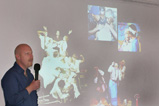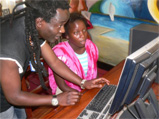
Ariane Mnouchkine is the director of Theatre du Soleil, Workers' Production Cooperative, which she created in 1964 with 9 other students in Paris. There is no simple way to characterize the complexity and variety in the performances created by the Theatre du Soleil in its 40 years lifetime: history, politics, testimony, the integration and reinvention of old theatrical traditions and narratives with the new, multiculturalism, the ethics of representing the Other - these have all been key concerns explored with diligent sensitivity. Perhaps the most economical way of introducing Mnouchkine and her group's work is to briefly explore one of the key words frequently associated with their practice of theatre: multiculturalism.
Multiculturalism: in what ways does the Theatre du Soleil go across cultures?
The most obvious answer seems to be the way in which some of their most famous productions have utilized and combined performance traditions and narratives from different cultures: for example, L'Age d'Or (1975-6, contemporary social and political issues performed with a combination of theatre techniques drawn from commedia dell'arte, traditional Chinese theatre and circus), Shakespeare's Richard II (1981, translated by Mnouchkine, performance influenced by various Asian traditions such as Japanese noh and kabuki, Balinese theatre, Kathakali), L'Indiade (1987-8, narrative based on the history of the decolonization and partition of India 1937-1948), The Flood Drummers (2002, narrative based on a 15th century Chinese tale, performance incorporating the form of Japanese bunraku puppet theatre), and Le Dernier Caravanserail (2003, presenting contemporary stories of immigrants, refugees and asylum seekers from around the world). One of the main motivations for drawing upon the performance and narrative traditions of other (in particular, Asian) cultures which has been voiced repeatedly by Mnouchkine is the need to go beyond the modern tradition of western realist theatre to find new expressive forms, a new theatrical language. Viewed from this perspective only, some of their productions might be in danger of being seen as engaging in a sort of 'cultural theft', a criticism which has indeed been applied by theorists to western 'intercultural' productions which exploit other cultures for their own artistic or commercial benefit without regard to the cultures they are taking from. However, Theatre du Soleil is able to avoid this kind of criticism precisely because of the deep sense of responsibility towards the voices and stories of others which Mnouchkine and her company, as well as Helene Cixous, the group's writer-in-residence, have carried consistently throughout their work.
 This sensitivity to the ethical issues of artistic representation is prominent in Le Dernier Caravanserail, a recent production based on the actual stories of refugees and other migrants displaced by war and political conflict from Afghanistan, Iran, Iraq, Russia, and many other places seeking refuge in Europe and Australia. The group spent two years in preparation, recording interviews with asylum seekers in refugee camps in Sangatte (France), Lombok (Indonesia), Auckland (New Zealand), and Villawood (Australia), which were then worked through discussion and improvisation into 143 scenes, of which 41 were selected for performance. The characters presented included a Serbian prostitute, a Kurdish people-smuggler, a young Russian woman forced into prostitution to help her and her mother escape, an Afghan man and his fiancee destined for a tragic ending through the Taliban, immigration officials, the Australian border patrol. Originally, Cixous was to write a play based on the group's collected research materials, as she had previously done for productions such as L'Indiade and Sihanouk, but in the end she limited her contribution to a few texts which appeared in the program. In these writings Cixous reflected on the precarious nature of translation, of making theatre out of real people's stories:
This sensitivity to the ethical issues of artistic representation is prominent in Le Dernier Caravanserail, a recent production based on the actual stories of refugees and other migrants displaced by war and political conflict from Afghanistan, Iran, Iraq, Russia, and many other places seeking refuge in Europe and Australia. The group spent two years in preparation, recording interviews with asylum seekers in refugee camps in Sangatte (France), Lombok (Indonesia), Auckland (New Zealand), and Villawood (Australia), which were then worked through discussion and improvisation into 143 scenes, of which 41 were selected for performance. The characters presented included a Serbian prostitute, a Kurdish people-smuggler, a young Russian woman forced into prostitution to help her and her mother escape, an Afghan man and his fiancee destined for a tragic ending through the Taliban, immigration officials, the Australian border patrol. Originally, Cixous was to write a play based on the group's collected research materials, as she had previously done for productions such as L'Indiade and Sihanouk, but in the end she limited her contribution to a few texts which appeared in the program. In these writings Cixous reflected on the precarious nature of translation, of making theatre out of real people's stories:
How do we avoid replacing the word from your lips with the sound of good intentions?
How do we avoid replacing your foreign language with our French language?
How do we keep your foreign language without being impolite or inhospitable to the public, our host in the theatre?
How, without understanding each other's words, can we all the same understand each other's heart?
How do we avoid appropriating other people's anguish when we use it to make theatre?
How do we avoid going wrong because we think we understand or because we are afraid we might not?
How do we come as close as possible to the other's place without taking it?
How do we avoid translating? That is, how do we avoid translating? We have to translate. . . .
And if we don't succeed? That's what the refugee asks on his/her journey.
Cixous, "Au commencement" from the program. Translated by William McEvoy.
As McEvoy argues in his article "Finding the Balance: Writing and Performing Ethics in Theatre du Soleil's Le Dernier Caravanserail (2003)" Cixous seems to have ceded her power to rewrite the refugees' stories creatively in favor of supplementing their stories in the program with her critical reflections as the more ethical artistic choice. In this production, Mnouchkine and her group had to carefully tread the line between their roles as artists and as members of a global community with the potential to harm or help the powerless. Clearly, a lot more here was at stake than aesthetic beauty or getting a favorable reaction from the audience - we can only imagine the unknown consequences of untruthful representation of those who cannot represent themselves, and yet paradoxically it was the Theatre du Soleil's admission of their own limited ability to represent the Other which might have been the greatest source of truth for their production.
The Theatre du Soleil's multiculturalism is not only limited to the content of their performances or their cross-cultural artistic influences - it is also a strong part of their identity. The company has grown in its ethnic diversity over the years; in 2003 members came from 35 different countries and spoke 22 different languages. "From the mid-seventies onwards, the Cartoucherie [the company's permanent space in Paris, formerly a munitions factory] acted as a shelter and rallying point for immigrants and sans-papiers in Paris, promoting the idea of theatre as a site of hospitality and reinforcing the company's emerging practice of intercultural performance" (McEvoy, 212). With the increasing global character of its membership and audiences, perhaps it is not surprising that the Theatre du Soleil offers the world an ever more clear vision of exchanges in a global artistic and political community, a future where we'll never cease to cross borders.
Bibliography
Copeland, Julie. "Theatre Du Soleil: The Flood Drummers", transcript of an interview with Adrian Kiernander and Nigel Jamieson on Radio National (Australia) program "Sunday Morning". Broadcast date, Jan 20, 2002. Accessed online at here. Date of access: July 15, 2007.
McEvoy, William. "Finding the Balance: Writing and Performing Ethics in Theatre du Soleil's Le Dernier Caravanserail (2003)" New Theatre Quarterly, 22:3 (August 2006), 211-26. Cambridge University Press. (doi: 10.1017/s0266464x0600042x)
Shine, Clare. "The backbone of her theatre". Financial Times, Jan. 23, 2007. Accessed online at here. Date of access: July 15, 2007.
Wehle, Philippa. "Theatre Du Soleil: Dramatic Response to the Global Refugee Crisis". PAJ: A Journal of Performance and Art, May 2005, Vol. 27, No. 2 (PAJ 80), Pages 80-86. Posted Online March 13, 2006. (doi:10.1162/1520281053850929)
Williams, David. Collaborative Theatre: The Theatre Du Soleil Sourcebook. London: Routledge, 1999.


 ЅпЇYЕnАOІЈЌАЅСВГ
ЅпЇYЕnАOІЈЌАЅСВГ